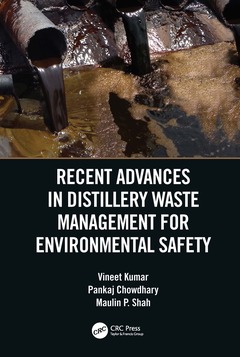Description
Recent Advances in Distillery Waste Management for Environmental Safety
Authors: Kumar Vineet, Chowdhary Pankaj, Shah Maulin P
Language: English
Subjects for Recent Advances in Distillery Waste Management for...:
Keywords
Distillery Effluent; Distillery Waste; Distillery Effluent Treatment; Microbial Fuel Cell; Anaerobic Digestion; Distillery Sludge; Distillery Wastewater; Molasses Wastewater; Manganese Peroxidases; Distillery Industry; Lignin Peroxidases; Ligninolytic Enzymes; Treating Distillery Wastewater; Cod Removal; UASB Reactor; Cod Reduction; EGSB Reactor; Alkaline Degradation Products; Biodiesel Production; UASB; Cod Removal Efficiency; AFB Reactor; Granular Sludge; MFCs Technology; CPCB
129.87 €
In Print (Delivery period: 14 days).
Add to cart· 17.8x25.4 cm · Hardback
Description
/li>Contents
/li>Readership
/li>Biography
/li>
The safe disposal of distillery waste into the environment, as well as its recycling and management, has become a hot topic in developing countries including India. This gross misconduct creates serious environmental and public health hazards. Thus, adequate management of waste has become a priority of environmental engineers and biotechnologists for environmental safety and sustainable development.
Recent Advances in Distillery Waste Management for Environmental Safety covers specific, advanced, and updated knowledge on various developed individual and/or innovative, green, and emerging plant-microbe-based technologies? uses for the management and recycling of distillery waste in an environmentally friendly and cost-effective manner for sustainable development. Moreover, this book provides comprehensive, state-of-the-art information on the physicochemical properties, chemical composition, and environmental risks associated with distillery waste. Furthermore, the book also discusses various existing methods and technologies; up-gradation of existing technologies; the advent of newer technologies for the treatment, processing, and disposal of distillery waste; and focus areas for further development. This broad and unique coverage allows treatment firms and regulatory authorities to determine and develop appropriate treatment strategies for site-specific problems of distillery waste remediation.
Features:
- Provides practical solutions for the treatment and recycling of distillery waste illustrated by specific case studies
- Focuses on recent industry practices and preferences, along with newer approaches for wastewater treatment
- An instructive compilation of treatment approaches, including advanced physicochemical and integrated/sequential methods
- Covers biocomposting of sludge and effluent, and biodiesel production from distillery waste for recycling and sustainable development
- Emphasizes the relationship of metagenomics with organometallic compounds of distillery waste
- Discusses the role of ligninolytic enzymes and bioreactors in distillery wastewater treatment
This book serves as an accessible reference to assist engineering consultants, industrial waste managers, policy makers, environmental engineers, government implementers, researchers, scientists, and a wide range of professionals responsible for regulating, monitoring, and designing industrial wastewater treatment techniques, who aspire to work on the reclamation, recycling, and management of distillery waste or wastewater pollutants for environmental safety and sustainable development.
Preface
Acknowledgements
Authors
Chapter #1 Introduction
Chapter #2 Distillery Waste Generation and Characteristics
Chapter #3 Colorants of Distillery Waste and Their Properties
Chapter #4 Environmental Impacts and Health Hazards of Distillery Waste
Chapter #5 Treatment Approaches of Distillery Waste For Environmental Safety
Chapter #6 Ligninolytic Enzymes in Degradation and Detoxification of Distillery Waste
Chapter #7 Bioreactors in Distillery Wastewater Treatment
Chapter #8 Phytoremediation: An Eco-Sustainable Green Technology for Remediation and Restoration of Distillery Waste Contaminated Environment
Chapter #9 Recycling and Reuse of Distillery Waste by Vermitechnology
Chapter #10 Sequential Treatment: A Novel Approach for Biodegradation and Detoxification of Distillery effluent for Environmental Safety
Chapter #11 Microbial Fuel Cell Technology in Distillery Wastewater Treatment and Bioelectricity Generation
Chapter #12 Biodiesel Production from Distillery Waste: An efficient technique to Convert Waste into Biodiesel
Chapter #13 Rules, Policies, and Laws Made by Government of Indian for Safe Disposal of Distillery Waste into the Environment
Chapter #14 Emerging Issues, Challenges, And Future Outlook of Distillery Waste Management
Chapter #15 Concluding Remarks
References
Index
Dr. Vineet Kumar is presently working as an Assistant Professor of Microbiology and Academic Coordinator at Vinayak Vidyapeeth, Meerut, India. He has obtained his M.Sc. (2010) and M.Phil. (2011) degree in Microbiology from Ch. Charan Singh University, Uttar Pradesh (UP), India. Subsequently, he joined the Department of Environmental Microbiology in 2012 at Babasaheb Bhimrao Ambedkar University (BBAU), UP, India, where he completed his doctoral work on the topic "Study of bacterial communities in two step treatment of post methanated distillery effluent by bacteria and constructed wetland plant treatment system". His research work had been supported by the University Grants Commission. He has also received merit certificate for the best academic contribution by Vice-chancellor of BBAU. After completion of his doctoral work in 2018, he joined the Department of Microbiology at Dr. Shakuntala Mishra National Rehabilitation University, Lucknow, UP, India as a Guest Faculty where he has taught courses in general microbiology, microbial genetics, molecular biology and environmental microbiology. He then went to Jawaharlal Nehru University (JNU), New Delhi, India, where he was trained on a DBT-sponsored research project under the supervision of Prof. Indu Shekhar Thakur. His research interests include the exploration of efficient microbe and plant based ecofriendly and sustainable strategies for the biodegradation, bioremediation and phytoremediation of environmental pollutants from contaminated sites. Presently, his research activities are focused on production of biodiesel and the recovery of bioplastic from industrial waste. Dr. Kumar has been also served as a potential reviewer for various scientific journals in his research areas. He has presented several papers relevant to his research areas at national and international conferences. He received a Young Scientist award in 2018 for his excellent contribution to Environmental Microbiology. To
These books may interest you

Environmental Waste Management 56.31 €

Environmental Waste Management 208.65 €


